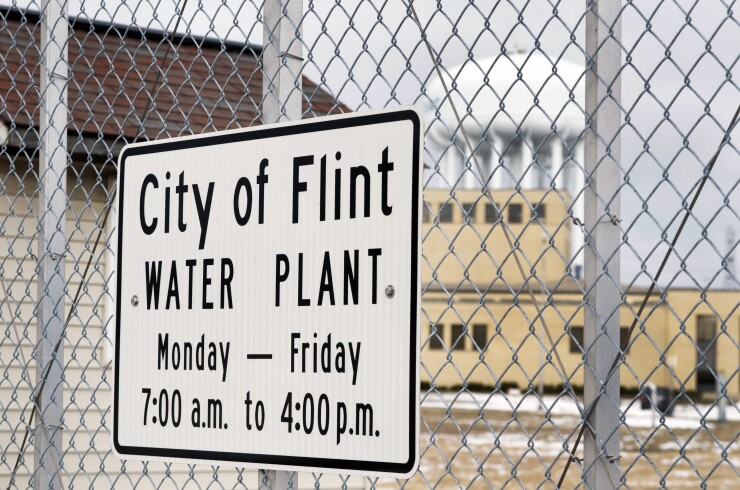DALLAS --Flint, Michigan’s city council is no closer to a decision over where to draw its water from after a special meeting Friday to discuss a contract with the Great Lakes Water Authority, its current supplier.
The city is under pressure to make a decision on a 30-year contract with GLWA under which it would lose water rights to the Karegnondi Water Authority, which will operate a new, under construction bond-financed pipeline to tap Lake Huron water.

Flint Mayor Karen Weaver and the state government are pursuing a plan that allows Flint to sell off its rights to pipeline water and use those funds to cover the portion of KWA debt it is obligated to repay. The city’s former emergency managers participated in the KWA project with Genesee County. When the city’s contract with Detroit's water agency, the GLWA's predecessor, ended the city started pulling water from the Flint River while awaiting completion of the new pipeline and didn’t treat the water, leading to a contamination crisis that fouled the city's water and its pipes. The council has so far refused to approve the new GLWA plan.
Attorneys from Flint and the state have been in mediation after the Michigan Department of Environmental Quality sued Flint last June over its inaction in choosing a long term water contract. The state seeks a declaration that the city council's failure to act is a violation of the Safe Drinking Water Act and wants the city to enter into the long-term agreement with GLWA.
Councilman Scott Kincaid, who is part of three-member ad hoc committee representing the city in the court ordered mediation, said council members are trying to come up with a solution that moves in a direction that would resolve the lawsuit. “We haven’t been able to come to a consensus yet,” said Kincaid at Friday’s special council meeting. “Our focus is having a reliable safe and affordable drinking water for the community and that will continue to be our focus. Our hope is to try and end this litigation and be able to come with a resolution.”
Gov. Rick Snyder said that he remains committed to Flint's recovery, and as part of that, wants what's best for the residents of Flint now, and well into the future. “He believes that keeping the city connected to pre-treated water from the Great Lakes Water Authority is the best option and will help drive long-term success for the people of Flint,” said Snyder spokeswoman Tanya Baker.
Flint’s city council has delayed the vote because it wants more time to look at the terms of the longer term water contract and, if required, explore other options. However the council hasn’t formally presented an alternative to replace the water contract with GLWA.
On Tuesday U.S. District Judge for the Eastern district of Michigan David Lawson said he was considering a 30-day extension to Flint’s short-term contract with the GLWA.
The 30-year contract with GLWA would replace plans to shift to the KWA pipeline.
The city is legally obligated to repay a portion of the $220 million 2014 bond issue that is financing construction of the authority’s 63-mile pipeline led by Genesee County. Flint pledged to repay 34% of the $220 million. The city’s bond commitment is estimated at $7 million per year, for the next 28 years. If Flint doesn't make its bond payment, Genesee County — the other primary partner in the KWA — is on the hook to take over the city's debt, because the county pledged its full faith and credit to the project.
The contract to stay with GLWA would result in about $9 million in savings, because it would lock in a more favorable rate with GLWA and Flint would recoup about $7 million in annual debt service by transferring its KWA water rights to GLWA.
Rich Baird, a senior aide to Michigan Gov. Rick Snyder, said last month that the council’s inaction is costing the city an extra $600,000 a month because it is paying a more expensive rate under a short-term water contract with GLWA and covering its bond obligation for the KWA pipeline.
The Flint city council recently approved plans to refinance up to $79 million of short-term debt sold last year to cover remaining construction costs of the KWA pipeline.





